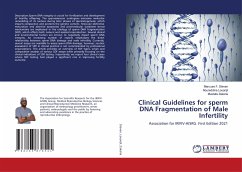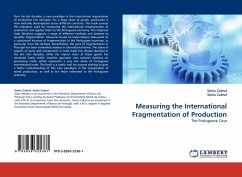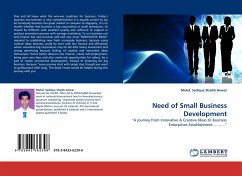
Clinical Guidelines for sperm DNA Fragmentation of Male Infertility
Association for IRIFIV-AISRG. First Edition 2021
Versandkostenfrei!
Versandfertig in 6-10 Tagen
41,99 €
inkl. MwSt.

PAYBACK Punkte
21 °P sammeln!
Description:Sperm DNA integrity is crucial for fertilization and development of healthy offspring. The spermatozoon undergoes extensive molecular remodeling of its nucleus during later phases of spermatogenesis, which imparts compaction and protects the genetic content. Testicular (defective maturation and abortive apoptosis) and post-testicular (oxidative stress) mechanisms are implicated in the etiology of sperm DNA fragmentation (SDF), which affects both natural and assisted reproduction. Several clinical and environmental factors are known to negatively impact sperm DNA integrity. An incre...
Description:Sperm DNA integrity is crucial for fertilization and development of healthy offspring. The spermatozoon undergoes extensive molecular remodeling of its nucleus during later phases of spermatogenesis, which imparts compaction and protects the genetic content. Testicular (defective maturation and abortive apoptosis) and post-testicular (oxidative stress) mechanisms are implicated in the etiology of sperm DNA fragmentation (SDF), which affects both natural and assisted reproduction. Several clinical and environmental factors are known to negatively impact sperm DNA integrity. An increasing number of reports emphasizes the direct relationship between sperm DNA damage and male infertility. Currently, several assays are available to assess sperm DNA damage, however, routine assessment of SDF in clinical practice is not recommended by professional organizations. This article provides an overview of SDF types, origin and comparative analysis of various SDF assays while primarily focusing on the clinical indications of SDF testing. Importantly, we report four clinical cases where SDF testing had played a significant role in improving fertility outcome.
Description:Sperm DNA integrity is crucial for fertilization and development of healthy offspring. The spermatozoon undergoes extensive molecular remodeling of its nucleus during later phases of spermatogenesis, which imparts compaction and protects the genetic content. Testicular (defective maturation and abortive apoptosis) and post-testicular (oxidative stress) mechanisms are implicated in the etiology of sperm DNA fragmentation (SDF), which affects both natural and assisted reproduction. Several clinical and environmental factors are known to negatively impact sperm DNA integrity. An increasing number of reports emphasizes the direct relationship between sperm DNA damage and male infertility. Currently, several assays are available to assess sperm DNA damage, however, routine assessment of SDF in clinical practice is not recommended by professional organizations. This article provides an overview of SDF types, origin and comparative analysis of various SDF assays while primarily focusing on the clinical indications of SDF testing. Importantly, we report four clinical cases where SDF testing had played a significant role in improving fertility outcome.
Description:Sperm DNA integrity is crucial for fertilization and development of healthy offspring. The spermatozoon undergoes extensive molecular remodeling of its nucleus during later phases of spermatogenesis, which imparts compaction and protects the genetic content. Testicular (defective maturation and abortive apoptosis) and post-testicular (oxidative stress) mechanisms are implicated in the etiology of sperm DNA fragmentation (SDF), which affects both natural and assisted reproduction. Several clinical and environmental factors are known to negatively impact sperm DNA integrity. An increasing number of reports emphasizes the direct relationship between sperm DNA damage and male infertility. Currently, several assays are available to assess sperm DNA damage, however, routine assessment of SDF in clinical practice is not recommended by professional organizations. This article provides an overview of SDF types, origin and comparative analysis of various SDF assays while primarily focusing on the clinical indications of SDF testing. Importantly, we report four clinical cases where SDF testing had played a significant role in improving fertility outcome.












